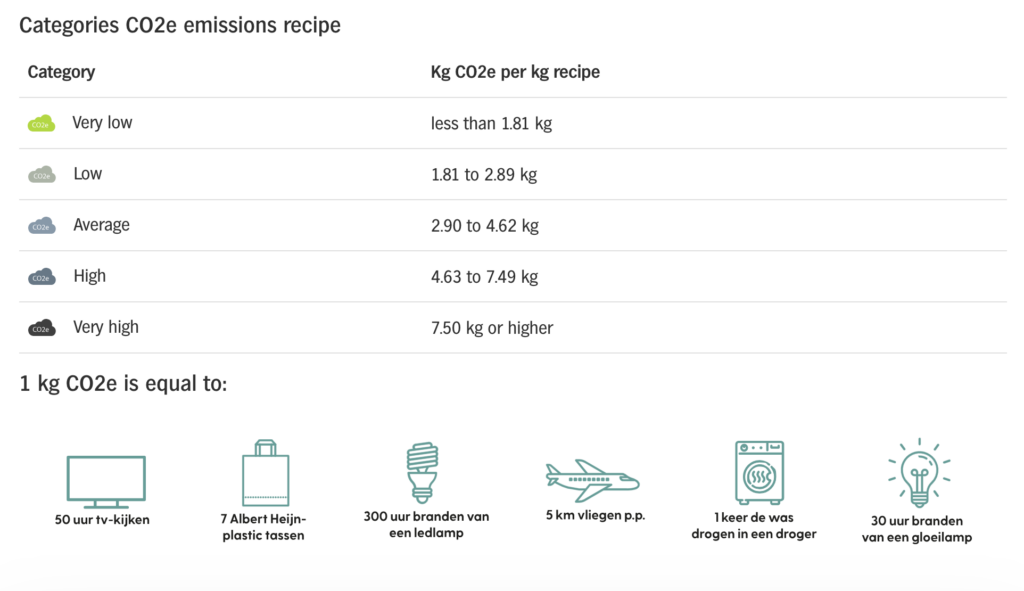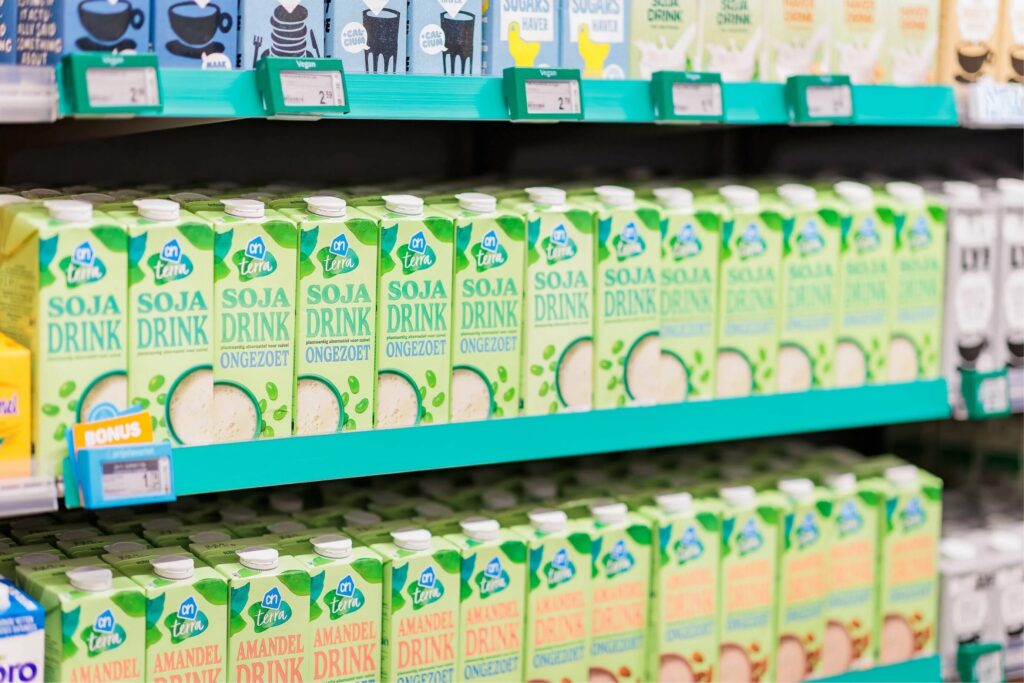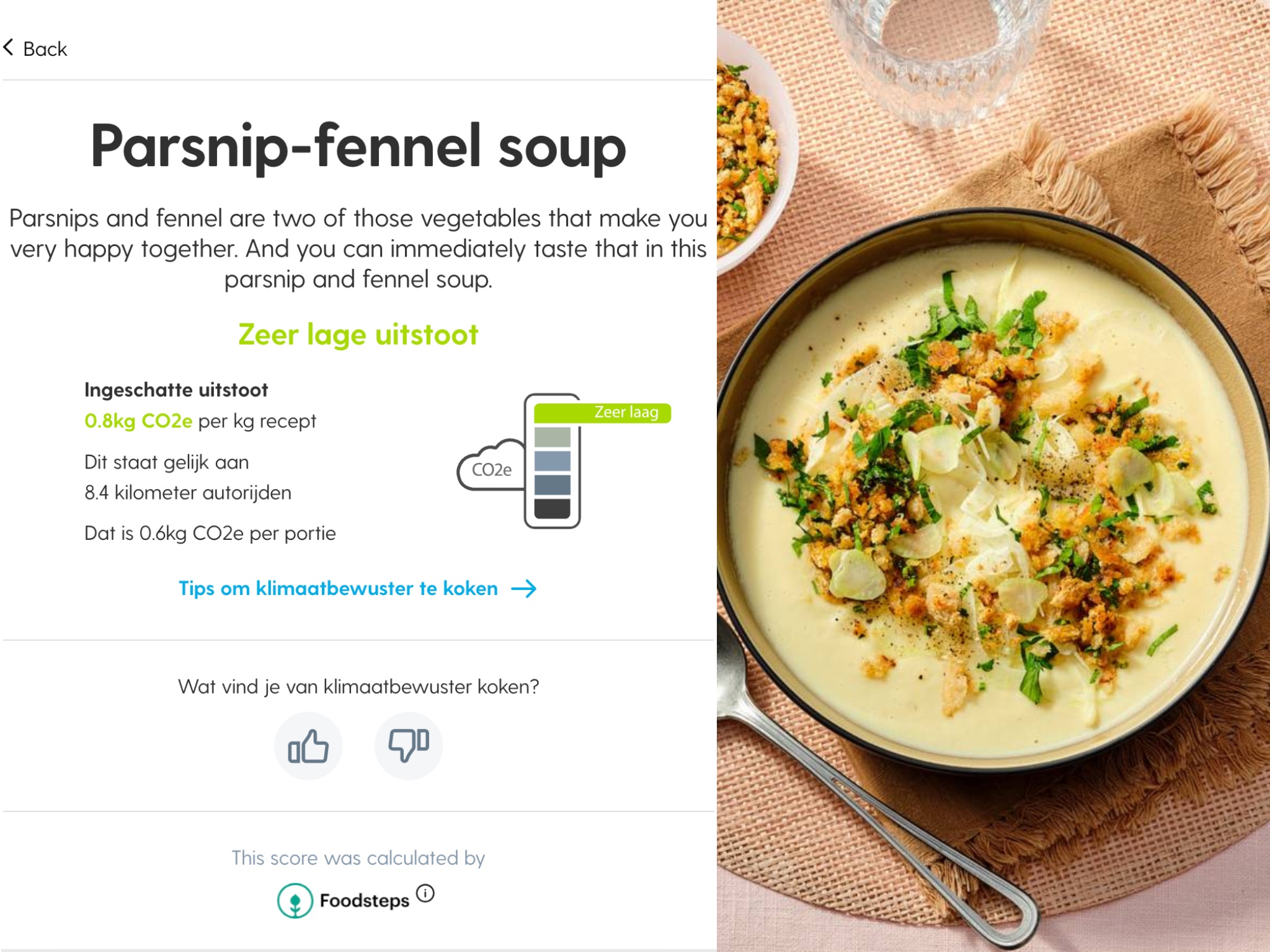Albert Heijn Introduces Carbon Labels to Own-Label Products & Magazine Recipes
5 Mins Read
Albert Heijn is the first Dutch retailer to introduce carbon labels on product packaging and recipes, which is part of a larger sustainability commitment that also addresses a transition to plant-based proteins.
Dutch supermarket Albert Heijn has rolled out emissions labelling on 130 private-label products, becoming the first retailer in the country to do so. It follows the release of its sustainability report on Tuesday, with a host of initiatives being introduced to meet its net-zero goals.
Initially, the company will introduce GHG emissions on its own-label chicken, pork, eggs, salmon and vegetarian products, with more products added gradually. Curiously, beef products aren’t part of the initial roster of carbon-labelled products, despite the Ahold Delhaize subsidiary rolling out half-chicken, half-beef burgers and mince to lower its emissions this year.
“The choices we all make every day for food and drinks influence people, animals and the climate. That is why we are working with our partners and suppliers to improve this influence and I am very proud of that,” said Albert Heijn CEO Marit van Egmond.
Albert Heijn wants to ‘help customers make informed choices’

The emissions of each product are displayed in the form of a small cloud, which states the carbon dioxide equivalent emissions per kg. “By mapping CO2e emissions and indicating them on the product and recipe, we help customers with information to make informed choices,” said van Egmond. “A good example are the eggs from the Better for Nature & Farmer programme, where we switch to white eggs, which produce 6% less CO2e emissions.”
But it’s not just in-store product packaging that features these labels – Albert Heijn is also rolling out the scheme next to recipes on its Allerhande food magazine, with an Eco-Score-like cloud indicating which emissions category the recipe falls in (ranging from very low to very high).
There’s a new climate-conscious cooking feature in its AH app as well, which is described as “cooking with CO2e emissions in mind”. Here, consumers can filter recipes by emissions category, with the app providing tips and inspiration for more planet-friendly ways to cook – this includes using more plant proteins like soy, legumes and nuts.
This follows Albert Heijn’s commitment to adding plant-based tips to on-pack recipes, after campaigning from Dutch animal rights group Wakker Dier. The organisation had asked nine companies to make at least 50% of the recipes on food packaging vegan or vegetarian. At Albert Heijn, 88% of these recipes aren’t meatless. But while it didn’t heed Wakker Dier’s call to remove meat from half of them, it does offer the highest number of meat analogues (36%) among the major retailers in the country.
And, along similar lines, the grocer began a trial in three of its To Go stores in April, allowing shoppers to pay either the normal price or the one reflecting the true cost of food production, which factors in climate impacts and the lack of a living wage for workers. This meant black coffee was up from €2 to €2.08, while coffee with milk increased by 36 cents, compared to an 11-cent hike for coffee with oat milk.
Protein transition key to net-zero goals

The carbon labelling rollout is part of Albert Hejin’s sustainability policy. The company, which claims to have been using only green energy since 2021, aims to reduce its scope 3 emissions (which make up 99.6% of its climate impact) by 45% by 2030 (from a 2018 baseline), working towards a longer-term net-zero goal for 2050.
By the end of the decade, it aims to be 100% emissions-free with its transportation system. And, to better support suppliers, it has launched the Albert Heijn Climate Club, which features with step-by-step plans, instructional videos and tips to reduce emissions. Plus, it’s also on its way to achieving B Corp certification.
The company has identified food and packaging waste as a problem too, having decreased the amount of materials in its packaging, while using as much recycled and recyclable material as possible, and making more offerings suitable for reuse where applicable. It outlines that circularity is key to its own waste and the construction or renovation of its stores.
But, without tackling food, Albert Heijn can’t reach its climate goals. It’s why it is working towards a protein transition, answering Wakker Dier’s request (alongside other supermarkets) to have at least 60% of proteins sold be plant-based by 2030. Albert Heijn’s goal for next year is for this to reach 50% – in 2023, this stood at 44.1% (up by 1.5 percentage points from the previous year). For this year, it is aiming for a 47% share of vegan protein, noting that if shoppers swapped an animal product for a plant-based one extra time per week, it would contribute 3.3 percentage points to the target.
To meet this ambition, the retailer will add new categories to its AH Terra range this year, including cooking and snacking, pizzas, ready-made meals and more plant-based dairy products. It’s also introducing new plant-based meal kits, while all other such fresh packages can be made vegetarian.
“By leading the protein transition and expanding our range with vegetable proteins, we offer our customers the opportunity to make conscious and more sustainable choices,” said Carlijn Olthof, manager of vegetarian merchandising at Albert Heijn. “The introduction of our own brand line AH Terra makes plant-based eating and drinking even easier. The products are tasty, affordable and of top quality. If everyone eats plant-based one day a week, a huge step can be made in the protein transition.”



